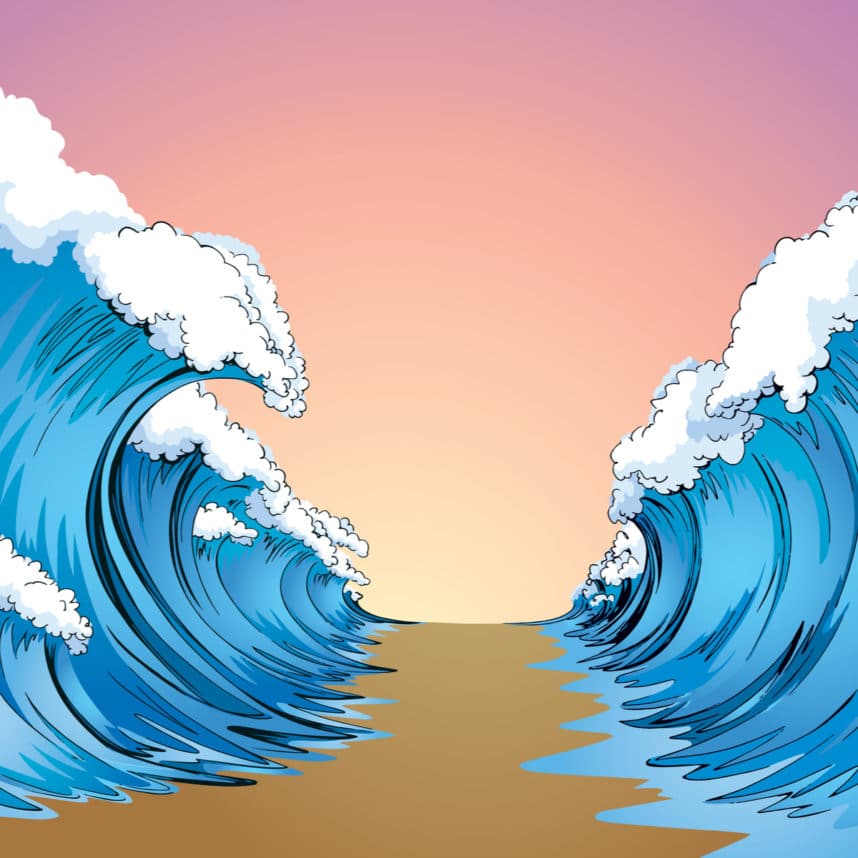
In the Bible, Passover is a seven-day observance, with the first and last days being holidays. The middle days are called “chol ha-mo’ed” “the mundane days of the holiday,” usually translated as “the intermediate days of the festival.” The first day commemorates, as you know, the exodus from Egypt, as recounted in Exodus 12. While the Torah never explicitly says so, the seventh day of the Passover holiday was understood by the ancient rabbis as commemorating the passing through the Sea of Reeds, described in Exodus 14 and 15. This Shabbat is the seventh day of Passover and the Torah reading is Exodus 13:17 – 15:26. This Torah reading includes both the dramatic narrative of Israelites at the Sea of Reeds, Exodus 14, and one of the greatest poems in the Hebrew Bible – the Song of the Sea, Exodus 15. The most well-known rabbinic interpretation of Exodus 14 (Talmud, Tractate Sotah 37a and other places) interprets Exodus 14:22, “and the Israelites went into the sea on dry land.” How could they go into the sea on dry land? The answer is: The sea only parted and a (relatively) dry seabed only appeared when they went into the sea. But who went in first? The talmudic aggadah (interpretations of biblical narratives) tells us that when the various tribes were dithering (“I’m not going in first,” “I’m also not going in first.”) Nachshon ben Amminadav of the tribe of Judah jumped in. If we go back to the Talmudic source, though, we read that the sea does not part right away. The first verses of Psalm 69 are attributed to Nachshon: Save me, O God, for the waters have come up to my neck. I sink in the miry depths, where there is no foothold. I have come into the deep waters; the floods engulf me. (NIV)
It turns out, then, that the waters did not part as soon as he jumped in, according to this interpretation. Nachshon was drowning a bit first. The meaning of Nachshon’s jumping in is heroic and clear. Someone has to go first; someone has to conquer their fear and do what needs to be done. The others dithered from trepidation. They knew that God and Moses were trying to part the sea, but something was going wrong. They didn’t absolutely know the sea would part. Someone had to act. Nachshon had to jump into the unknown, be willing to risk everything. Maybe the sea would not part – but he knew he was not going back to Egypt. “Live free or die.” Nachshon is role model for courage. So far, so good. Why does this bit of aggadah want to tell us, though, that Nachshon was drowning before the sea was parted? I think the authors of this tradition were telling us, “Not so fast.” We would love to imagine that as soon as Nachshon put his foot into the water the dry land appeared. His will and his courage were all that mattered and all that were needed. We don’t like to think of Nachshon drowning; for a long moment thinking “It didn’t work. I actually am going to die.” It seems that the Talmud, by including the drowning prayer from Psalm 69, wanted to add a step after the step into the sea. Let’s put ourselves in the mind of the dithering other tribes. I imagine a complete silence while they watched Nachshon drowning. When he stepped into the water, they perhaps were ready to see a miracle, but not a tragedy. As they watched Nachshon drown, just for a few seconds they knew that their fears were justified. What happens in those few seconds to the dithering ones? I’d like to add to the Nachshon story. In my extension of this bit of aggadah, something happens to that sentiment, “Live Free or Die.” The focus is now on “die.” We are taught in the Talmud to repent one day before our deaths. Always look at your life as if you have only one more day. That “next day” defines how we live. In my extension of this aggadah, for the few seconds in which they see Nachshon drowning, that day is now. The question in the mind of the dithering ones is suddenly, “How will I die?” A captured slave runaway, some years hence? Or right now, following Nachshon to the bottom of the sea, drowned, but free. In my addition to this aggadah, the sea parts not when Nachshon puts his foot into the water, but when the next person does. I wonder who that was.
 RSS Feed
RSS Feed















 April 3rd, 2021
April 3rd, 2021  FAKE NEWS for the Zionist agenda
FAKE NEWS for the Zionist agenda  Posted in
Posted in  Tags:
Tags: 













